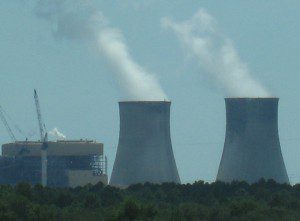 Pointing to a law encouraging more nuclear power, state regulators on Monday agreed to allow Florida Power & Light and Progress Energy Florida to collect about $282 million from customers next year for nuclear projects.
Pointing to a law encouraging more nuclear power, state regulators on Monday agreed to allow Florida Power & Light and Progress Energy Florida to collect about $282 million from customers next year for nuclear projects.
The state Public Service Commission (PSC) approved $196 million in nuclear costs for FPL and $86 million for Progress — though that was $55 million less than what Progress requested.
PSC Chairman Art Graham pointed to economic problems facing many consumers in reducing the Progress amount.
“I think anything we can do to minimize the impact today is a good thing,” he said.
FPL will use $171.8 million for upgrading two existing nuclear plants in St. Lucie and Miami-Dade counties, with the rest of the money earmarked for a project to build two reactors in Miami-Dade, according to a PSC staff document. Almost all of the Progress money will go toward a project to build two reactors in Levy County.
Allowing the companies to collect the money, however, is a controversial issue. While customers pay toward nuclear projects now, the companies will not start generating electricity from new reactors for another decade — and are not guaranteed to ever build them.
The Legislature in 2006 approved a law that allows utilities to collect money far in advance of nuclear projects being completed. The PSC on Monday repeatedly pointed to that law, which is aimed at encouraging utilities to tackle multibillion-dollar projects to add nuclear energy.
“The companies are following what the intent of that statute was, and we as the commission are implementing the statute as was (required) by the Legislature,” said Commissioner Ronald Brise, a former state House member from North Miami.
But the Southern Alliance for Clean Energy, which took part in the case, issued a statement blasting the PSC decisions.
“It is a sad day for Florida ratepayers’ wallets when the Public Service Commission keeps approving millions of dollars for Progress Energy and FPL on nuclear projects that will likely never be built,” said Stephen A. Smith, the organization’s executive director. “It’s like free money for the utilities — talk up a project, sell the idea to the Legislature and PSC, delay it multiple times and keep vacuuming up ratepayers’ hard-earned dollars.”


